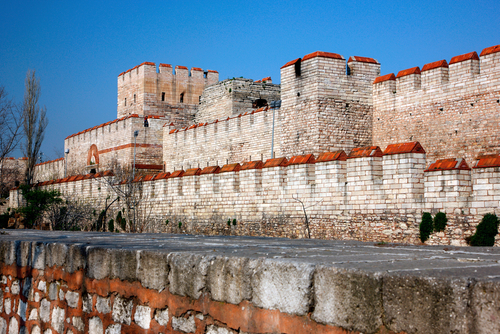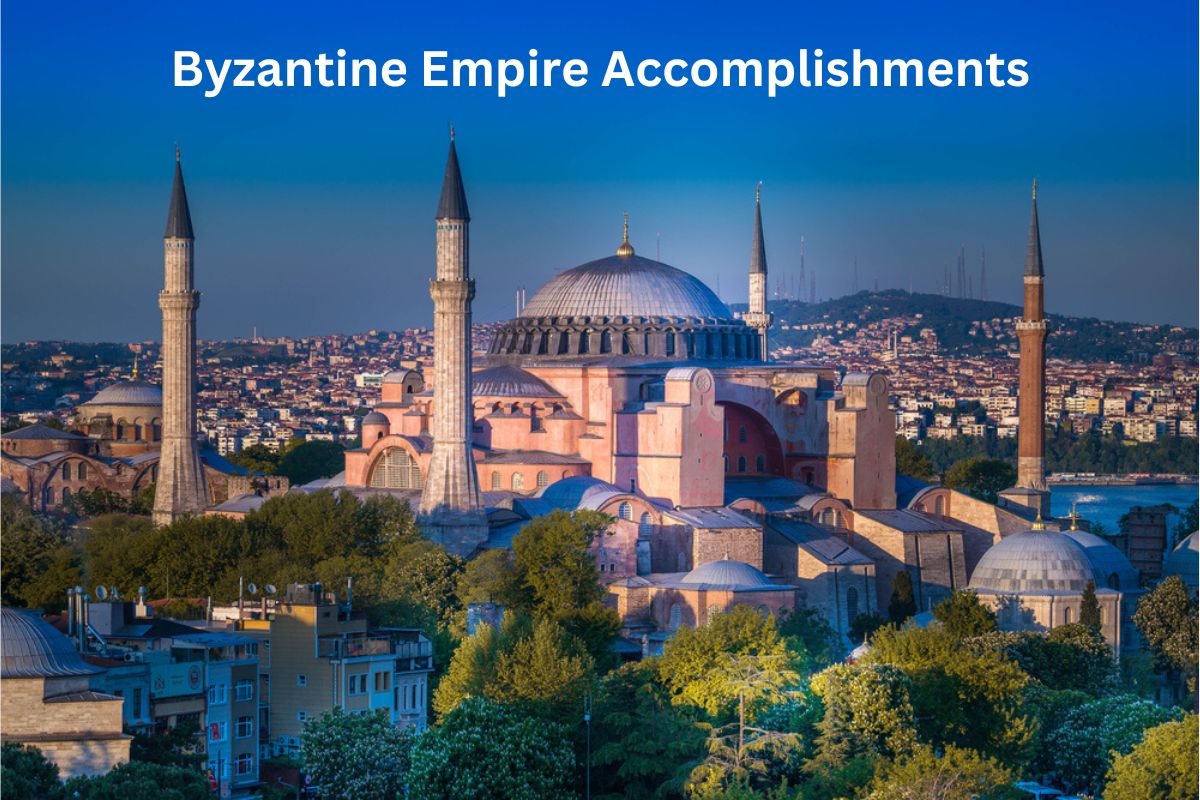The Byzantine Empire, also known as the Eastern Roman Empire, was a powerful and influential state that emerged from the remnants of the Western Roman Empire.
Spanning over a millennium, from the 4th to the 15th centuries, the Byzantine Empire left a lasting impact on the world. Known for its rich culture, advanced civilization, and strategic location, the Byzantines made significant achievements in various fields.
These accomplishments include the preservation of ancient knowledge, the creation of Justinian’s Code of Law, the development of unique art and architecture, the invention of Greek Fire as a weapon, diplomatic influence with other powers, innovative military tactics, the preservation and spread of Christianity, advancements in medicine, prominence in silk production and trade, and intellectual contributions to literature and philosophy.
These achievements contributed to the Byzantine Empire’s enduring legacy and its influence on subsequent civilizations.
Accomplishments of The Byzantine Empire
1. Preservation and transmission of ancient knowledge
The Byzantine Empire played a crucial role in preserving and transmitting the knowledge of ancient Greece and Rome. During the decline of the Western Roman Empire, Byzantium served as a stronghold of classical learning.
Also Read: Facts About the Byzantine Empire
Monks and scholars in Byzantine monasteries meticulously copied and preserved numerous ancient texts, including philosophical works, scientific treatises, historical accounts, and literary works. These preserved texts were later influential in the Renaiss
2. Creation of Justinian’s Code of Law
Emperor Justinian I, who ruled from 527 to 565, sought to establish a unified and comprehensive legal system for the Byzantine Empire.
Under his direction, a team of legal experts compiled and organized existing Roman laws, legal opinions, and edicts into a single legal code known as the Corpus Juris Civilis (Body of Civil Law).
Also Read: Byzantine Empire Timeline
This code became the foundation of Byzantine law and had a profound impact on subsequent legal systems in Europe, including the civil law tradition.

3. Development of distinct Byzantine art and architecture
The Byzantines developed a unique style of art and architecture that combined elements of classical Roman, early Christian, and Eastern influences. Byzantine art is characterized by its religious focus, rich symbolism, and use of vibrant colors.
Iconography, the veneration of religious icons and images, played a central role in Byzantine art. In architecture, the Byzantines were known for their grand churches with domes, intricate mosaics, and ornate decorations.
The most famous example is the Hagia Sophia in Constantinople, which served as a model for later Byzantine and Ottoman architecture.
Byzantine art and architecture had a lasting impact on the development of Christian art and influenced subsequent artistic traditions in Eastern Europe and the Mediterranean.
4. Invention and use of Greek Fire as a weapon
One of the most notable military achievements of the Byzantine Empire was the invention and use of Greek Fire.
This was a highly effective incendiary weapon used primarily in naval warfare. Greek Fire was a substance that could be projected in various ways, including through tubes or launched from ships. It was highly flammable and difficult to extinguish, sticking to surfaces and burning even on water.
The exact composition of Greek Fire was a closely guarded secret, known only to a select few in the Byzantine military. Its use provided a significant tactical advantage to the Byzantines, helping them repel numerous naval invasions and defend their maritime territories.
5. Diplomatic and political influence with other powers
The Byzantine Empire maintained extensive diplomatic and political relationships with neighboring states, as well as distant powers such as Western Europe, the Islamic world, and the Mongols.
Byzantine diplomacy played a crucial role in mediating conflicts, forging alliances, and maintaining stability in the region. Emperors and diplomats engaged in negotiations, marriage alliances, and treaties to secure the empire’s interests and protect its borders.
The Byzantines often acted as intermediaries and cultural mediators between the East and the West, facilitating the exchange of ideas, technologies, and goods.

6. Innovative military tactics and strategies
The Byzantine Empire developed innovative military tactics and strategies that played a significant role in its survival and expansion. One key aspect was the development of effective infantry and cavalry formations.
The Byzantine army employed the use of heavily armored and well-disciplined infantry known as the “tagmata,” as well as skilled cavalry units called “cataphracts.” These units were organized into disciplined and flexible formations that could adapt to different battlefield situations.
The Byzantines also perfected the use of defensive fortifications, such as walls and moats, to protect their cities and borders.
Additionally, the empire made use of intelligence gathering, espionage, and strategic alliances to gain advantages over their enemies. These military innovations allowed the Byzantines to successfully defend their territories and repel numerous invasions, preserving the empire for centuries.
7. Preservation and spread of Christianity
The Byzantine Empire played a significant role in the preservation and spread of Christianity, particularly Orthodox Christianity.
Byzantine emperors actively supported and promoted the Orthodox faith, constructing numerous churches, monasteries, and religious institutions throughout the empire.
They patronized the arts and sponsored the creation of religious artwork, including icons and mosaics, which played a central role in religious rituals and worship.
Byzantine theologians and scholars, such as John of Damascus and Theodore the Studite, contributed to theological debates and the development of Orthodox doctrine.
The Byzantine Empire’s influence on Christianity extended beyond its borders, as it acted as a bastion of Orthodox faith and served as a cultural and religious link between the East and the West.
8. Advancements in medicine and healthcare
Byzantine physicians made noteworthy advancements in the field of medicine. Drawing from the knowledge of ancient Greek and Roman medical texts, Byzantine scholars compiled medical treatises that expanded the understanding of various diseases, anatomy, and therapeutic treatments.
Byzantine medical practitioners were skilled in a wide range of areas, including surgery, pharmacology, and herbal medicine. They developed innovative treatments for ailments, performed surgeries, and improved methods of diagnosis.
The Byzantines also established hospitals and medical centers where patients could receive care and treatment, reflecting their commitment to public health and the well-being of their citizens.
9. Prominence in silk production and trade
The Byzantine Empire held a dominant position in the production and trade of silk during its existence. Silk production, originally a closely guarded secret of the Chinese, was introduced to the Byzantines through the Silk Road trade routes.
Byzantium became a major center for the production of silk, particularly in the region of Thrace and the city of Constantinople. The Byzantines developed techniques for sericulture (silkworm breeding) and silk weaving, establishing a flourishing silk industry.
Byzantine silk was highly sought after, and the empire played a pivotal role in the exchange of goods and ideas along the Silk Road, contributing to its economic prosperity and cultural influence.
10. Literary and intellectual contributions
Byzantine scholars and writers made significant contributions to various fields of knowledge, including literature, philosophy, and historiography.
Byzantine historians such as Procopius, Agathias, and Anna Komnene documented significant events, including the reign of Justinian I, the Persian Wars, and the Crusades. These historical works provide valuable insights into the politics, society, and culture of the Byzantine Empire.
Philosophers like Michael Psellos and John Italos contributed to the philosophical discourse of their time, engaging in debates on metaphysics, ethics, and logic.
Byzantine literature encompassed a wide range of genres, including epic poetry, romance, and theological treatises. The works of Byzantine writers and intellectuals reflected a blend of classical Greek influences and Christian thought, leaving a lasting legacy in the development of intellectual traditions in the medieval world.
